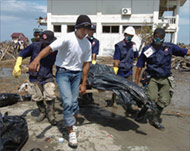Aid workers restricted in Aceh
Indonesia is standing firm on tough restrictions requiring military escort for foreign aid workers in its tsunami-hit Aceh province, insisting the threat from armed rebels is genuine.

The move to lock down the jealously guarded region, where many of Indonesia‘s 106,000 disaster casualties died, came as the country’s vice-president said foreign troops bringing help should leave within three months.
Until the 26 December earthquake unleashed destructive oceanic forces, Indonesia had sealed off Aceh to outsiders while it conducted a major military offensive to crush separatists locked in a long-running independence struggle.
After the tsunami struck, the region was thrown wide open to relief workers and journalists, with thousands of foreign volunteers and troops rushing to bring humanitarian assistance.
Now Indonesian authorities say foreign aid missions and journalists must register and be accompanied by the military if they travel outside main towns, while Indonesian officers would be placed on foreign ships and planes.
Safety measures
Despite statements from Free Aceh Movement rebels, known as GAM, pledging the safety of volunteers, welfare minister Alwi Shihab said the government was concerned that attacks on aid staff could scare off foreign assistance.
|
“We are trying to safeguard the safety of all of you. We don’t want any of you to be hurt by irresponsible GAM members” Alwi Shihab, welfare minister |
“We are trying to safeguard the safety of all of you. We don’t want any of you to be hurt by irresponsible GAM members,” Shihab told reporters in Banda Aceh, the tsunami-destroyed provincial capital.
Asked if foreigners would be arrested or deported for violating the restrictions, the minister said it was unlikely.
“No, we hope you will all be civilised and respect these rules. We are requesting the cooperation of international communities,” he said.
Military officers said aid agencies in the badly-hit west Aceh town of Meulaboh were already venturing unaccompanied beyond the town and failing to adhere to a voluntary curfew.
The military would like to “remind them again and again since some people” are ignoring the ruling, an unnamed officer said.
No threat
But the rebels said they would never attack aid workers.
 |
|
Aid workers have restricted |
GAM supreme commander Muzakir Manaf said: “The Aceh National Armed Forces guarantees the safety and free access to all parts of Aceh for international aid workers.”
An aid group in Aceh, Oxfam, and a security analyst, Sidney Jones, also rejected Sutarto’s assertions, saying there was no threat from rebels to the relief effort.
Jones, an expert from the International Crisis Group on Indonesian military and security affairs, said the government’s real motive was to reassert the military’s control as it sought to crush the rebellion.
United Nations coordinator for Aceh Joel Boutroue said he did not believe there was a threat from the rebels, adding that although his organisation had no objection to the measures, it was clear security was not the only goal.
“They want to have the situation under control for political reasons as well as security reasons. That’s understandable,” he said.
Pete Sweetnam, team leader for non-governmental group Mercy Corps in Meulaboh, said the orders “may have an effect on our operation”, adding that “complete humanitarian access is the ideal”.
Danger
Shihab said the danger was highlighted by the abduction and shooting of one Indonesian health official in the days after the disaster struck. The doctor he was referring to later told reporters he was robbed but not shot.
“We are afraid this case will be repeated on our generous international donors. We are requesting the cooperation of the international community, we are all here to make the international operation successful,” Shihab said.
He rejected accusations that Indonesia was seeking to reassert the control of its military in Aceh at the expense of the humanitarian effort, although he admitted the new restrictions would be a drain on resources.
|
“We can work together. But if they came here with some hidden agenda – colonialism, imperialism or missionary – I think this is very, very dangerous.” Hilmy Bakar Almascaty, leader of the Islamic Defenders Front |
“There is no politics in this, we want you to be safe,” he said.
Indonesian Vice-President Jusuf Kalla on Wednesday said foreign troops should leave tsunami-hit Aceh province as soon as they finish their relief missions, staying no longer than three months.
“Three months are enough. In fact, the sooner the better,” Kalla was quoted by the state Antara news agency as saying.
Religious agenda
Some groups are also concerned Western agencies involved in the relief could also be pushing a religious agenda.
An Islamic group in the world’s most populous Muslim nation warned foreign aid agencies in Aceh not to stray from their humanitarian mission.
“We can work together. But if they came here with some hidden agenda – colonialism, imperialism or missionary – I think this is very, very dangerous,” said Hilmy Bakar Almascaty, leader of the Islamic Defenders Front.
Although groups from the Jewish organisation B’Nai Brith and Catholic Relief Services to evangelical Christians and Mormons are raising money or working with the survivors, little in the way of missionary work can be seen.
“I have met with some of the radical groups and their main concern is the humanitarian mission,” Shihab said. “I don’t think the Christians would do [missionary work]. That would backfire.”
The Indonesian military imposed marital law in Aceh in May 2003, banning most foreign journalists and aid workers from the province, as it ramped up its military offensive against the separatists.
The government lifted the restrictions on aid workers and journalists immediately after the tsunami disaster, although a state of emergency remains in place.